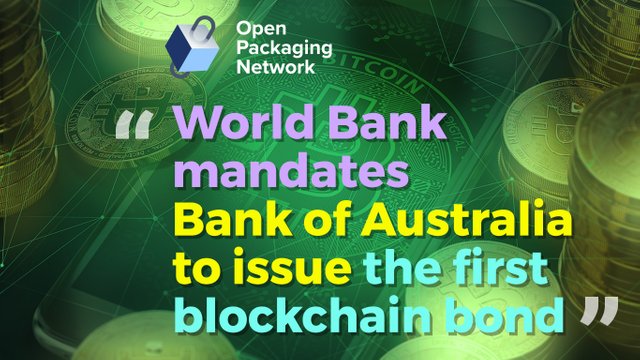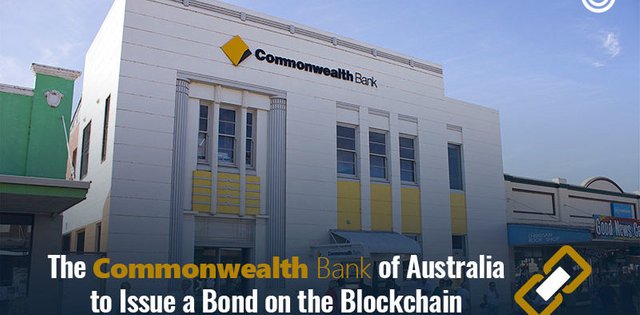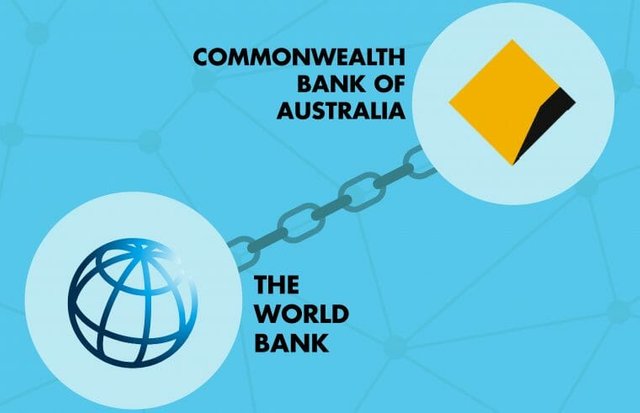World bank mandates Bank of Australia to issue the first Blockchain bond

It has already been baptized the “Kangaroo Bond”, the “bond-i” - standing for Blockchain-Offered New Debt Instrument - denominated in Australian Dollars, based on the Ethereum protocol and hosted on Microsoft’s Azure (a cloud storage service), that is the very world’s first bond created, allocated and managed using blockchain technology. The World Bank, a global non-profit organization working towards mitigating health risks, diseases, and poverty in the developing world, chose the Commonwealth Bank of Australia (CBA) to pioneer this ambitious project.

A strategic move, made by one of the world’s most influential financial institutions to start leveraging blockchain technology to improve their offerings: bond issuance forms, indeed, already a large part of the World Bank, which is estimated to deploy over $60 million via bonds each year as part of the bank promoting and developing a sustainable, technology-driven ecosystem. A move that aims to explore the use of blockchain technology across different operations. “That is the fundamental difference – stated Paul Snaith from the World Bank treasury - if you have a trusted record, there is no need for every participant to have their own copy of their position. If everybody trusts the ledger, all we need to do is point to it to know and report our positions.”
.jpg)
The decision, which will make history in global and above all Australian financial market, seems to be based on different factors: surely, the Australian bank’s Blockchain Centre for Excellence, which designed and developed the bond-i on the base of a previously tested prototype bond on blockchain in 2017 in partnership with the Queensland Treasury, is one of the firsts.
.jpg) Secondarily, the country is one of the world most crypto-friendly at the moment, with a largely favourable regulation, a high market demand and many experimentations in the field: in 2017 Australia’s big four banks revealed that Queensland Treasury Corporation had issued a “virtual crypto-bond” using the banks’ private blockchain program; last month it was one of the participants in a cross-border, blockchain-enabled logistics effort which saw 17 tons of almonds shipped from Victoria, Australia to Hamburg, Germany.
Secondarily, the country is one of the world most crypto-friendly at the moment, with a largely favourable regulation, a high market demand and many experimentations in the field: in 2017 Australia’s big four banks revealed that Queensland Treasury Corporation had issued a “virtual crypto-bond” using the banks’ private blockchain program; last month it was one of the participants in a cross-border, blockchain-enabled logistics effort which saw 17 tons of almonds shipped from Victoria, Australia to Hamburg, Germany.
.jpg)
CBA executives, which implemented the technology within their existing frameworks and declared to be open to explore the use of other blockchain platforms, believe a successful demonstration of bond issuing on the blockchain will prove the technology’s advantages of a “facilitating platform for different participants.”
The team used a law firm to act as the deal’s counsel for the issuance of bonds on the platform they developed, which is aimed at three areas of global trade, operations, documentation, and finance. Users would have access to container information, task-tracking and documentation through the blockchain platform, that has reviewed by Microsoft, from its architecture, security, and resilience, giving an added edge of credibility to the project and ensuring the platform and software are “solid, bug-free, and have no vulnerabilities to attack.”

The development team, in addition to the advice given for the legal architecture of the smart contracts, will govern the Blockchain Offered New Debt Instrument (bond-i), that will be issued, using a private Ethereum blockchain, by the World Bank in Washington, even if as there is no central bank-backed digital currency in existence, the two-year blockchain bond will rely on real-world money: Australian dollars.
And up to now, QBE, Northern Trust, and the Treasury Corporation of Victoria, three institutional parties, have already confirmed their interest in the blockchain-issued bond, even if it’s not the first time financial institutions use blockchain technology to improve their offerings: also in July Spanish banking group BBVA signed a blockchain-based loan worth $117 million in July, hoping to take advantage of the transparency and traceability afforded by the contract and at the Money 20/20 conference, last June, some of the world’s leading banks declared they had just started to monitoring the blockchain space
 “We recognize that in a distributed system, there is the potential for resilience, and other benefits of distributed payment systems is one that we want to make sure we are aware of and that is fully integrated to the work we are currently doing to our own infrastructure”, the Bank of England’s Fintech Head of Division Martin Etheridge declared.
“We recognize that in a distributed system, there is the potential for resilience, and other benefits of distributed payment systems is one that we want to make sure we are aware of and that is fully integrated to the work we are currently doing to our own infrastructure”, the Bank of England’s Fintech Head of Division Martin Etheridge declared.
This could be the beginning of a golden future for blockchain technology for financial services: the development lender aims to raise about AU$50 million (about US$36 million), although it could be double that if more investors get involved before the bond is finalized the week of August 20. At that point is almost certain that other big banks will join the success of the operation and will trust in the power of blockchain disruptive technology
“Since our first bond transaction in 1947, innovation and investor satisfaction have been important hallmarks of our success with leveraging capital markets for development,” World Bank Treasurer Arunma Oteh said“Today, we believe that emerging technologies, equally offer transformative, yet prudent possibilities for us to continue to innovate, respond to investor needs and strengthen markets.”